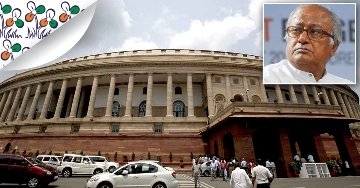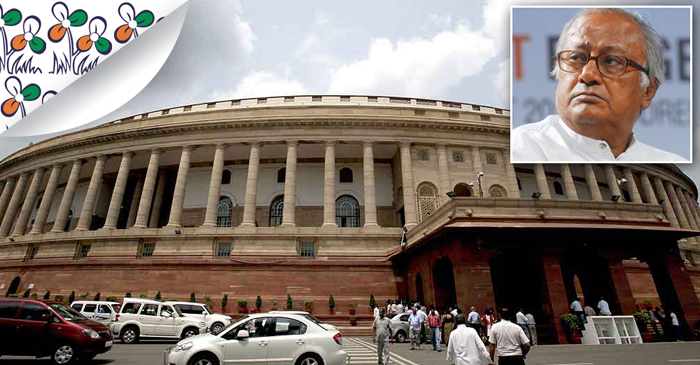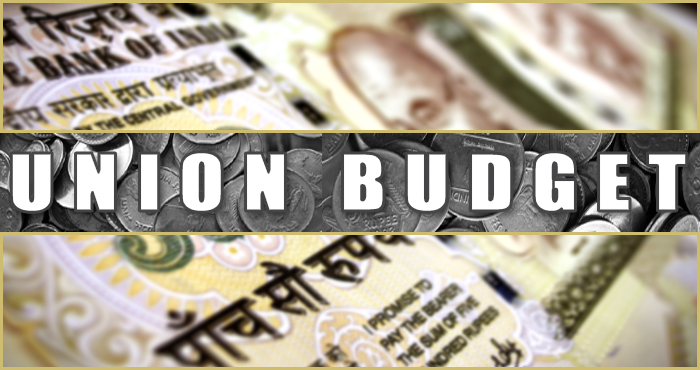Full transcript:
Thank you Madam.
I rise to speak on the Budget presented by Sri Arun Jaitley and I hope that he will be back soon to listen to our points. I have also listened very carefully to the speeches made by Sri Veerappa Moily, Sri Hukmdev Narayan Yadav and Sri Thambidurai.
I shall try to avoid duplication of whatever they have said. I also came to Lok Sabha in 1977. Hukmdev Narayan Yadav Ji said a few minutes back. From a lohiyavadi he has become a hindutyavadi. I want to address my questions to him only.
The Finance Minister has started by talking about the successes of the Government like Jan Dhan, coal auction and Swach Bharat. He has also talked about the Government’s plan up to 2022. Nobody knows, whether they will be in power till then.
Madam, the Budget speech appears to be self congratulatory. The Finance Minister has said that the opportunity has arisen, because we have created it. Let me, examine his statement. Inflation is certainly down, and so is Current Account Deficit. But this has more to do with the fall in the international crude prices, from $110/ barrel in June 2014 to $57/ barrel currently. Instead of passing on the benefits of the decline to the consumer, the Government has hiked Excise Duty to petrol and diesel by Rs 7.75 and Rs 6.5 per litre respectively, mopping up thousands of Crores of additional revenues.
The Finance Minister claims that he has been successful, but in the last financial year, the gross tax revenue have fallen by Rs 1.13 lakh Crore from the budget estimates last year and direct and indirect tax collections have fallen on all heads. This poses questions on the growth revival story.
The Finance Minister said that the growth rate is 7.4%. This is questioned by his own department, in the Economic Survey. The Economic Survey says, “Notwithstanding the new estimates, the balance of evidence and caution council in favour of viewing India, as a recovery rather than surging economy.”
So, 7.4% may not have been achieved, it is only due to the change of indices by the Central Statistical Organisation, that the Government has claimed that there is a great growth and we are a surging economy.
I wanted Hukmdev Narayan Yadav Ji to be present.
Now let me point out to him what the Government has done with regard to taxes. They have not raised the Income Tax exemption limit from Rs 2.5 lakh to Rs 3 lakh. This has been criticized by nobody other than Sri Yashwant Sinha, the father of our young Minister of State for Finance. This was also included in the BJP’s Election Manifesto but they have not fulfilled it.
Now Indirect Taxes are up by Rs 23000 crore, direct taxes are down by Rs 8300 crore which means what? Indirect taxes mean a pressure on the consumer. Increase in prices. Direct taxes directly target individuals so this is an anti middle-class step.
Then what they have done? Corporate Tax for the big corporates are being reduced by 5% by 2017. Also Wealth Tax has been abolished. GAAR the General Anti-Avoidance Rules applied to big corporates investing outside has been deferred by two years. So this is a corporate friendly budget. I do not know what Hukumdev Narayan Yadav of Congress would be saying because there are no concession to the middle class, to the common man rather the corporate tax is being reduced. For whom is this target?
Now let me go to some of the Budget estimates. What are the headings under which there has been budget cut – he was talking about kisans. This is the most anti farmer budget in many years. Agriculture has been cut by 14.3%. National Food Security Mission has been lowered by Rs 530 crore. Only the Prime Minister’s Krishi Sinchai Yajona has been increased to make the Prime Minister happy. What about education? Education has been slashed by 16.5%. School education has been cut by 25%. This will affect the mid-day scheme. Primary education ‘Sarba Shikshya Aviyan’, has been cut by 22%.
Now important schemes such ICDS, which gives health food to children. The Budget has been cut from Rs 16316 crore to Rs 8000 crores, to keep the poor children hungry. Sir, even the National Rural Livelihood Mission (MGNREGA) which used to give jobs in rural areas, has been cut from Rs2034 crore to Rs 1800 crore. Sir, NRHM, has remained at the same level. So the every scheme which benefits the poor rural people has seen a cut. If you call this pro poor, pro kisan where kisans budget has been cut, I oppose.
Now the Finance Minister has talked big about devolution of resources. He said look we have accepted the Finance Commission’s recommendations which has suggested devolution from 32% to 42%. But what is actually the total devolution? Whereas he has given with one hand, he has taken away with the other. You will be surprised to know that increase in devolution is Rs.1.36 lakh crore but the Centrally sponsored schemes, grants and loans have been cut by Rs 1.34 lakh crore. So actually from 61.9 devolution is only 62.8%
Now, let me say, basically this Government does not believe in devolution of resources. Look at the case of West Bengal. I shall give you some statistics, Sir. They say that they have helped West Bengal. The Finance Commission has not been favourable to West Bengal, because they included in their criterion of a forest cover of 7.5%. What has happened because of that? Madhya Pradesh, which has got a much lower population than West Bengal, has got 7.54% share of the States, whereas West Bengal has got only a share of 7.34%.
West Bengal with a much larger population has got the same level of Madhya Pradesh. Bihar has got less population than West Bengal, but it has got 9.665%. So, even in the devolution by the Finance Commission of which Government cannot take credit, because like all other previous Governments, they have accepted the recommendations of the Finance Commission, we have suffered.
The Finance Minister can well come and say that, he has given West Bengal some revenue deficit grant of Rs 11,000 Crore. Out of this Rs 11,000 Crore, only Rs 8,500 Crore is being paid this year. We have to pay Rs 31,000 Crore to the centre for loans incurred by the previous Left Front Government. So, we are in fact paying Rs 23,000 Crore extra.
Our Chief Minister came and pleaded that please defer the collection of the past loans and interest on it, otherwise your Rs 11,500 Crore will be chicken feed. The Centre has not listened. We have paid interest on loans of Rs 82,000 Crore in the last three and half years, out of which Rs 76,000 Crore relates to the previous Government.
Now, let me come to the main thing, why this Government is called as anti poor. They are cutting the schemes of ICDS because they will introduce new scheme of sharing. The new scheme of sharing has three categories. One category is that they will fully funded by the Centre. The second category is that they will be shared between the State and the Centre in a changed pattern. The third category is where the Centre will not pay a single rupee.
The BRGF, which earlier helped the backward region of the country, has been abolished. The Centre will not pay a single rupee. So, 23 schemes will be funded by the Centre, 13 schemes will be shared between Centre and State and there are schemes which are totally de-linked like BRGF, modernisation of police, which you mentioned, national e-governance plan will not get a single rupee from the Centre.
What do we see about the Centre? What is their road map? What is their policy? If you study carefully, their policy can be summed up like this.
A) Their fiscal roadmap is a compression of public spending on welfare measures. Centre will not pay any money on the welfare of the poor people.
B) The narrowing focus on public investment on sectors like railways, road, defence and hoping to trigger a recovery in the private investment.
C) The tax give-aways to corporate sectors and financial elite.
D) Mopping up revenues through increase in indirect taxes, disinvestment and hike in user charges.
Now what is their formula. Their formula is cut all these welfare measures. Give extra Rs 70,000 crore to invest in infrastructure then maybe the growth rate will rise. This Government believes in a top down approach, they believe in trickle down approach. No help for poorer people. No help for agriculturist, workers, students, youth, nobody. We will create wealth at the top by the corporates slowly it will trickle down below. We are against this.
The whole policy of the Government, the ‘modinomics’ that has been expostulated by the Finance Minister is an anti-poor step.
What does reforms mean for them? Reforms mean the new Land Law which we have opposed tooth and nail. New coal auction law. New mines and minerals law . Increase in FDI in Insurance. Increase in FDI in Defence. So money will come from the Corproates and from the foreigners. Open the door for them – remove GAAR. Vodafone may buy over Hutchinson in Mauritius but run the business in India and not pay a single rupee in taxes, that is why I appreciate Jayant’s father, Yashwant Sinha. He said GAAR should have been included this year, General Anti-Avoidance Rules. This people who buy companies abroad should be made to pay here but the present Government does not believe. What is its motto? Its motto is corporatize. Make everything into a corporation. They are now proposing to corporatize the ports run by the government against which the port workers are going on strike. They want to corporatize the ordinance factories. They want to privatise airports. They want to privatise whatever is in Government’s hand and if it is to believe Sir, this year Rs 65000 crore they are hoping to get through public sector disinvestment. This is like selling the family silver. This is what the Government is doing at the alter of the corporates, hoping that this will trigger a growth, take India to new heights.
India will not advance in this way. Sir, we are opposed to this total philosophy of the Government which takes away the nutritious food the children are getting. This will take away the mid-day meal because they are saying states will do this. Now, states you give them 42% untied funds. The states have their own priority. They may build irrigation dams, build roads then what will happen to the ICDS children? They what will happen to the mid-day meals? What will happen to the poorer sections of people for whom a Centrally sponsored meal was a guide. Please isko implement karo, that will go. The poor will become poorer.
This is not the way for India. What they are saying we have given more power to the state, as I said they have not devolved more money. I am reminded of a Urdu sher which says – panchhi jo urti hai, chaman badal gaya, haste hai sitare toh gagan badal giya. Aaj shamashan ki khamoshi bata rahi hai lash wohi hai sirf kafan badal gaya.
They are the same only they have given a new packaging. Mr Jaitley’s Budget is nothing but a packaging on behalf of the corporates.
Thank you.







